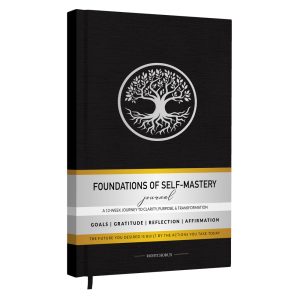If you’re searching for time to leave job quotes, chances are something inside you is whispering it might be time to move on.
Maybe it’s a quiet dissatisfaction, a burnout you’re trying to ignore, or the persistent tug of unfulfilled dreams.
Whatever it is, transitional moments like these deserve compassion, clarity, and courage.
That’s where reflection becomes powerful—and a well-timed quote can sometimes deliver just the insight you need.
In this blog post, you’ll discover over 30 inspirational quotes to validate your feelings, encourage your next step, and guide your inner process.
Plus, we’ll explore how reflective writing and mindfulness—especially through tools like the Foundations of Self-Discovery Mastery Journal—can help unlock the clarity and self-trust necessary for life-changing decisions like leaving a job.
Foundations of Self Discovery & Mastery Journal: A 13-Week Personal Development Journal System
$29.95
The Foundations of Self Discovery…
Table of Contents
Time to Leave Job Quotes That Speak the Truth
Deciding to leave a job isn’t easy. Often, we need gentle reminders that change is not failure but a doorway to growth.
The right time to leave job quotes can speak directly to your experience, helping you name feelings that have remained unspoken.
Below are more than 30 thoughtful quotes, grouped by theme to connect with your personal journey.
Burnout & Emotional Fatigue
Emotionally depleted workplaces make us doubt our resilience. These quotes center your well-being:
- “If you’re burned out, you need a break—not a breakdown.” – Unknown
- “Sometimes the job is not hard. It’s just that your soul is tired.” – Najwa Zebian
- “Don’t confuse having a career with having a life.” – Hillary Clinton
- “Rest is not a reward—rest is a right.” – Tricia Hersey, The Nap Ministry
Toxicity & Misalignment
Some environments drain rather than support. These quotes give you language for when enough is enough:
- “You don’t have to set yourself on fire to keep others warm.” – Unknown
- “Toxic workplaces don’t deserve your loyalty.” – Dr. Thema Bryant
- “Respect yourself enough to walk away from anything that no longer serves you.” – Robert Tew
- “The culture of a place is not worth your peace.” – Brené Brown
Growth, Purpose & Possibility
These quotes plant seeds of ambition and remind you of your worth:
- “Don’t stay somewhere out of loyalty when there’s no mutual respect.” – Unknown
- “If it doesn’t challenge you, it won’t change you.” – Fred DeVito
- “Leave what no longer grows you.” – Morgan Harper Nichols
- “When you know your value, you stop giving people discounts.” – Unknown
Dreams Can’t Wait
Staying in the wrong job delays the right future. Consider these:
- “The best way to predict your future is to create it.” – Abraham Lincoln
- “Your new life is going to cost you your old one. Read that again.” – Unknown
- “Don’t be afraid to give up the good to go for the great.” – John D. Rockefeller
- “Life is too short to be stuck in a job you hate.” – Anonymous user, r/antiwork
These quotes not only validate the urge to change—they reflect the inner wisdom you often silence.
Using the Foundations of Self-Discovery Mastery Journal alongside these quotes can deepen your self-awareness and guide your decision-making with heart and clarity.
Foundations of Self Discovery & Mastery Journal: A 13-Week Personal Development Journal System
$29.95
The Foundations of Self Discovery…
How to Know When It’s Time to Quit Your Job

Reading inspirational quotes is validating—but recognizing when those words apply to your story is key.
There are mental, emotional, and even physical signs that hint it might be time to leave your job.
Understanding those signs and reflecting on them can be your first real act of self-honor.
The decision to transition isn’t always about dramatic burnout. Sometimes, the discomfort is subtle: boredom, frustration creeping in, or feeling plateaued.
When you notice these internal red flags, your inner compass is gently telling you it’s time.
When Your Growth Stalls: Listening to Yourself
One of the strongest signs that it’s time to move on is when you’ve stopped growing.
Career development isn’t just about promotions—it’s also about alignment with your deeper values.
Stagnation often creates inner tension that manifests through irritability, procrastination, or low-grade anxiety.
That’s where self-reflection comes in. The Foundations of Self-Discovery Mastery Journal is designed to help you track these feelings, clarify values, and recognize patterns of dissatisfaction.
With frameworks like “What to Improve” and “Tomorrow’s Next Step,” it turns inner questioning into intentional journaling.
Emotional and Physical Signals
- You dread Mondays—and Tuesdays, and most weekdays
- You come home drained, regardless of workload
- You constantly fantasize about quitting
- You feel undervalued or unseen at work
Listening to your body and heart is not weakness—it’s wisdom.
Foundations of Self Discovery & Mastery Journal: A 13-Week Personal Development Journal System
$29.95
The Foundations of Self Discovery…
Journaling Through Career Crossroads
Career changes inevitably bring uncertainty. In these moments, journaling becomes a lifeline—not just for venting emotions but for processing values, naming fears, and visualizing next steps.
Guided reflection offers you a mirror to your unique path.
That’s why journaling, especially with a structured tool, is one of the most effective ways to navigate job transitions wisely and confidently.
Foundations of Self-Discovery Mastery Journal: Your Inner Compass
Engineered for clarity, the Foundations of Self-Discovery Mastery Journal is your personal growth companion during pivotal career moments.
Built around eight Self-Discovery Pillars—including Purpose, Boundaries, and Inner Voice—this 13-week journey supports:
- Daily guided prompts to process workplace emotions and track career clarity
- Weekly reflections to identify patterns and obstacles
- Mindful morning and evening entries for emotional balance
- Vision mapping and achievement celebrations to inspire forward movement
Professionals reconsidering their careers often say, “I don’t know what else I’d do.” This journal helps answer that by gently expanding your self-awareness and courage.
Lucy, a former marketing executive, journaled with this system and realized her burnout wasn’t due to workload—it was the misalignment of her core values with the company’s mission.
She made a values-based pivot into nonprofit work and never looked back.
Foundations of Self Discovery & Mastery Journal: A 13-Week Personal Development Journal System
$29.95
The Foundations of Self Discovery…
Mindfulness Practices for Career Decision-Making

When life feels like a whirlwind, getting quiet isn’t optional—it’s essential. Mindfulness keeps us grounded as we make powerful life decisions. Career changes especially demand inner steadiness.
Using mindfulness practices in conjunction with focused journaling can shift muddled fear into meaningful direction. Here’s how to cultivate mindfulness before making a big move.
Breathwork and Journaling
Combining conscious breathing with writing taps into the parasympathetic nervous system.
It slows reactivity, reduces stress, and boosts insight. After 3 minutes of slow diaphragmatic breathing, try responding to prompts like “What am I afraid to admit about my job?” or “What patterns keep repeating?”
The Foundations of Self-Discovery Mastery Journal synchronizes beautifully with breathwork by offering reflection spaces that welcome emotional honesty.
When your nervous system is calm, your inner voice gets louder.
Quiet Time Before Big Decisions
- Do a “no-input” morning: no emails, no social media—just you and your thoughts
- Sit quietly for 10 minutes to tune into your intuition
- Ask, “What would future me thank me for?”
- Write one page unfiltered to reveal unconscious insights
With mindful awareness and honest writing, clarity is no longer a mystery—it becomes a decision you trust.
Foundations of Self Discovery & Mastery Journal: A 13-Week Personal Development Journal System
$29.95
The Foundations of Self Discovery…
Stories from People Who Knew It Was Time To Leave
Thousands of people have stood where you’re standing: questioning whether to leave, aching for permission to go.
Here are some real stories (inspired by Reddit threads and coaching conversations) from those who journaled, reflected, and ultimately took the leap.
“The Misaligned Manager”
James, a mid-level manager in finance, said he was feeling “hollow” despite making good money.
After three months of journaling, he noticed that his joy disappeared every Sunday night.
He finally acknowledged what his journal entries hinted at: he was climbing a ladder that leaned against the wrong wall.
He pivoted into consulting, aligning with his passion for sustainability.
“The Silent Burnout”
Elena, a teacher, hadn’t realized her chest tightening daily wasn’t normal. Through consistent journaling, she uncovered years of emotional suppression.
Her realization? “Burnout had become my baseline.” She eventually negotiated a sabbatical to prioritize mental health—and returned with renewed boundaries and clarity.
These small moments of reflection created big waves.
Conclusion
Transitions are invitations—your discomfort is the usher guiding you forward. Time to leave job quotes don’t just motivate us; they reflect our deeper truth, especially when paired with self-reflection and clarity practices.
If you’re standing at a professional crossroads, journaling with structure and sincerity can be your most powerful tool.
The Foundations of Self-Discovery Mastery Journal provides a thoughtful, transformative space to reconnect with your purpose, navigate uncertainty, and organize your next steps.
Step toward what energizes you. The timing may not feel perfect—but your growth demands movement.
Your next chapter is waiting. Are you?
Frequently Asked Questions
Some of the most popular include Brené Brown’s “Choose courage over comfort” and Steve Jobs’ “Don’t settle.” Other quotes focus on burnout, boundaries, and purpose. We’ve listed over 30 inspiring ones in this post.
Consider leaving if you feel chronically undervalued, burned out, unsupported, stagnant, or if your work consistently undermines your well-being or values. Journaling can help monitor these inner cues over time.
Self-inquiry and structured journaling are key. The Foundations of Self-Discovery Mastery Journal supports you with reflective prompts to align your next move with your values and goals.
Absolutely. Journaling surfaces hidden patterns and emotions. With consistency, you gain clarity on what energizes you versus what drains you. It becomes easier to assess when it’s time to pivot.
Yes. Outgrowing a job is a valid reason to leave, even if nothing appears broken. Inner misalignment often shows up quietly—and that’s still reason enough to honor your needs.
Use prompts like: “What no longer feels right?”, “What excites me now?”, or “When do I feel most drained?” The Foundations of Self-Discovery Mastery Journal contains dozens more tailored to career transition moments.
Fear is normal during change. Acknowledge it through mindfulness or journaling. Writing down worst-case scenarios and countering them with rational reassurances helps. Try pairing your journal time with breathing exercises.
Yes—especially when they reflect your inner reality. Quotes crystallize complex feelings and provide courage. They initiate self-honesty and remind you of what’s possible.
Start by defining your values. When they consistently conflict with your day-to-day role, this indicates misalignment. Journaling helps trace these subtle but persistent incongruencies.
The Foundations of Self-Discovery Mastery Journal provides structure, mindfulness, and guided prompts—an ideal companion for when you’re questioning what’s next professionally.







